discomfort support

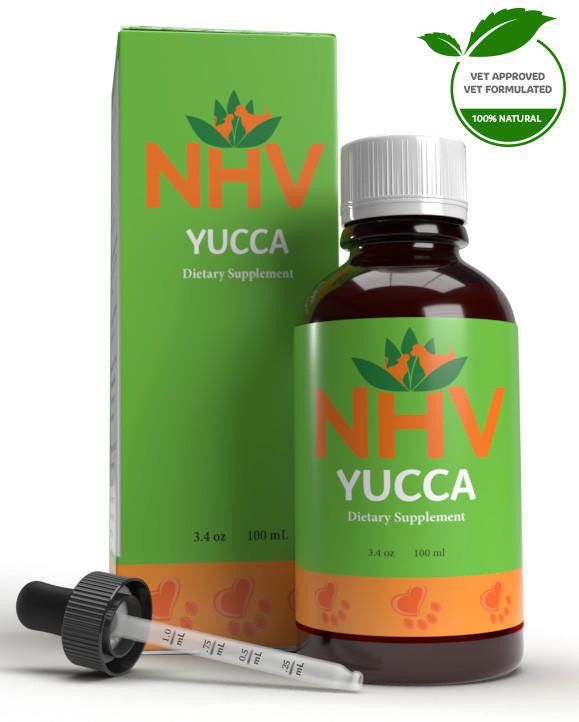
free shipping over $100 (USA & Canada)
1-877-937-4372 the pet expert hotline
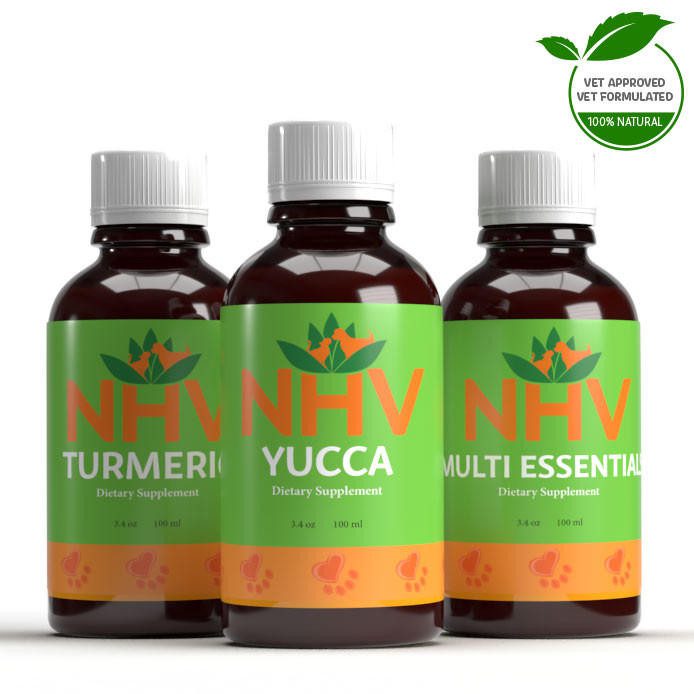
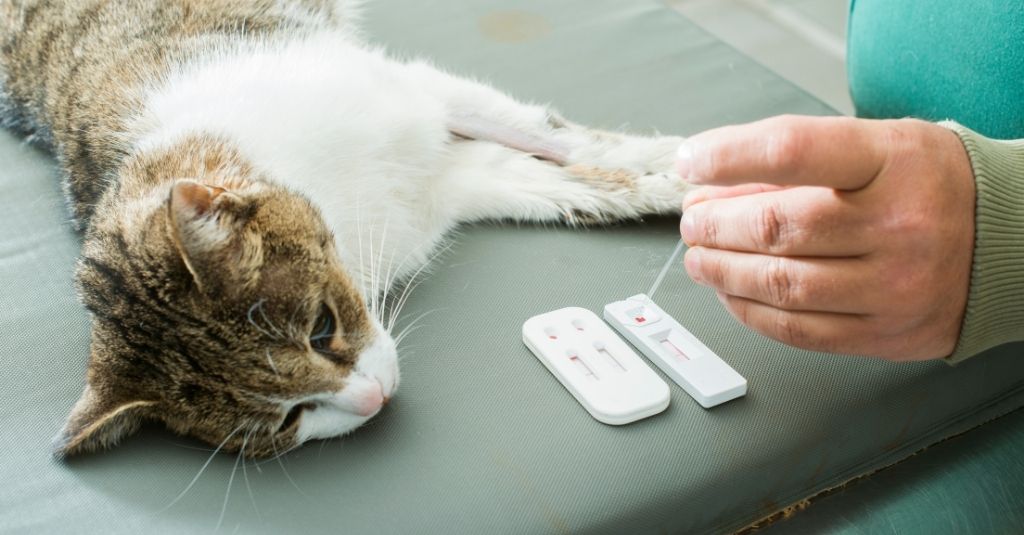
In my practice, I see anemia frequently as I deal with senior pets, and terminally ill dogs and cats. Anemia is defined as a decreased hematocrit (HCT) or hemoglobin. Packed cell volume (PCV) is the same definition as hematocrit which is a calculated value from the mean cell volume and red blood cell count and hemoglobin concentration, which are provided by blood analyzing machines. One of the main functions of red blood cells is the delivery of oxygen. When this is low, all body systems can slow quickly due to inadequate oxygen delivery.
One of the main functions of red blood cells is the delivery of oxygen.
Without adequate oxygen delivery, your pet may be weak, tired and lethargic, and in the worst cases unable to breathe well. You might notice his or her normally pink tongue or nose is pale. Anemia generally occurs as a result of another disease, you may also see signs of the underlying problem such as excessive drinking and urinating, vomiting, bloody or tarry stools or a bloated stomach, very dry coat, and or just generalized weakness. Anemia in Cats and dogs occurs when the HCT is below 25 in cats and below 30 in dogs. Cats below 15% and dogs below 20% are very serious anemia.
Anemia itself is not a disease — it is a sign of an underlying problem. So when your veterinarian says your pet is anemic, like me, we are going to recommend looking for an underlying reason. That will include additional testing such as blood chemistries, infectious disease testing, autoimmune testing, urinalysis, and imaging such as radiographs and or ultrasound depending on the presenting clinical signs.
Blood loss from autoimmune disease, bone marrow insufficiency, inadequate intake of iron, parasite infestation, or neoplasia. Other causes of anemia include anesthetic agents, tranquilizers which can result in apparent anemia due to physiologic reasons. In addition, young animals frequently have anemia due to rapid growth rate in the first few months of life (generally < 4 months old)
Anemia is treated according to its underlying cause; But if I am presented with an older patient with clinical signs of anemia such as a pale tongue, dry coat, smooth paw pads, and weak femoral pulses, I will treat additionally with supplements and food to combat blood deficiency which often accompanies anemia.
Food recommendations typically include blood enriching foods such as liver and beef.
Supplements include NHV Multi Essentials, Yucca, and Turmeric in addition to Chinese herbs, omega 3 fatty acids, and a change in diet. Treating the whole patient for anemia has the best chance for resolution.
If any of you have any questions about our cat or dog suffering from anemia, please contact one of the NHV pet experts!
discomfort support


Support for Discomfort and Appetite Stimulant
buy 2 and save $3
3 month supply for a small to medium size
NHV Yucca is used for cats as a supplement to provide nutrients, and may be helpful for discomfort, inflammation, and to increase or balance the appetite.


NHV Yucca is used for cats as a supplement to provide nutrients, and may be helpful for discomfort, inflammation, and to increase or balance the appetite.

Yucca is used in cat food as well as food for other animals around the world. Its root is a highly nutritious herb that’s rich in vitamin C, beta-carotene, B vitamins, magnesium, iron, calcium, manganese, protein, niacin, and phosphorus.
Yucca contains two very beneficial compounds: sarsasapogenin and smilagenin. These two compounds work on the mucous membranes of the small intestine. These compounds help with the penetration and absorption of minerals and vitamins. Sarsasapogenin and smilagenin are known as steroidal saponins (phytosterols) which act as precursors to corticosteroids produced naturally by the body.
Steroidal saponins support the immune function of the body while stimulating and supporting the production of its own corticosteroids and corticosteroid–related hormones. Due to this action, studies conducted on Yucca have shown that it may be beneficial and effective for discomfort relief and inflammation in conditions such as arthritis. Yucca for cats may also be a natural appetite stimulant and may also help reduce the production of urease, which contributes to the unpleasant odors of urine and feces in some cats.
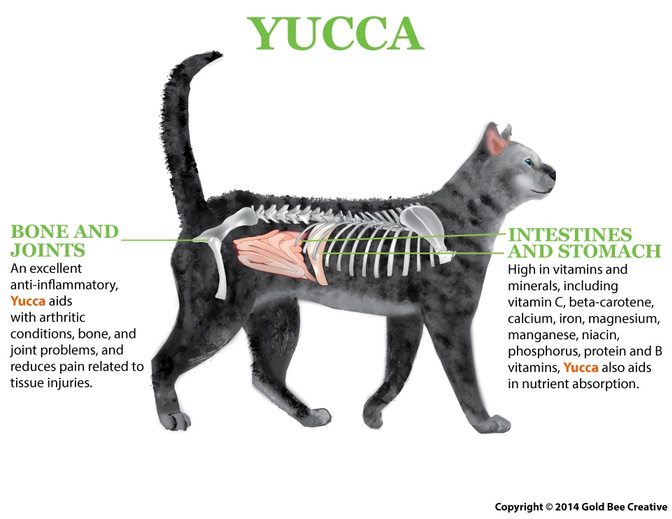
Yucca - Commonly used for supporting arthritis, as an anti-inflammatory, nutritive, antitumor, and digestive supplement.
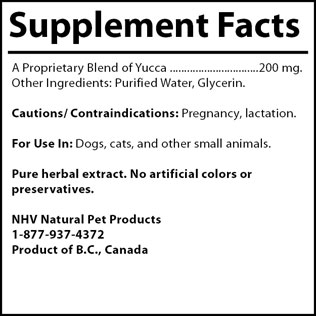
Select your pet's weight to determine the correct dose.
To be taken twice daily. Determine your pet’s weight and then use the easy chart below to determine the correct dose. This is the minimum dosage.
Pet's Weight Dosage
0 - 15 lb = 0.5 ml
16 - 30 lb = 1.0 ml
31 - 45 lb = 1.5 ml
46 - 60 lb = 2.0 ml
61 - 75 lb = 2.5 ml
Over 75 lb = 3.0 ml
How to Administer: Shake well before use. The easiest method is to use the dropper provided and place the drops into your pet’s food or favorite treat. You can also use the dropper and squirt directly into the pet’s mouth. Some pets can be finicky, if this occurs consider hiding the drops in foods most pet’s love such as fish, chicken, yogurt, or a favorite treat. If your pet only eats dry food then soak a few kibbles at feeding time.
For Best Results: Herbal dietary supplements are beneficial to the health and well-being of your pet and are safe for long-term use. Every pet responds to natural herbal supplements differently, therefore it is important to be consistent and administer the product daily. Supplements generally take two to four weeks to take effect, however this will vary from one animal to the next.
Product Storage:
All NHV Natural Pet Products are pure herbal extracts and contain no artificial additives, preservatives or coloring. Shelf life after opening is 6 months and must be refrigerated after opening.
Cautions and Contraindications
Do not use Yucca in pregnant or nursing animals.
Speak to your vet before using our products. A second visit is recommended if your pet’s condition does not improve, or deteriorates after continued use of the supplements. All information provided by NHV Natural Pet Products is for educational purposes only.
Yucca is used in cat food as well as food for other animals around the world. Its root is a highly nutritious herb that’s rich in vitamin C, beta-carotene, B vitamins, magnesium, iron, calcium, manganese, protein, niacin, and phosphorus.
Yucca contains two very beneficial compounds: sarsasapogenin and smilagenin. These two compounds work on the mucous membranes of the small intestine. These compounds help with the penetration and absorption of minerals and vitamins. Sarsasapogenin and smilagenin are known as steroidal saponins (phytosterols) which act as precursors to corticosteroids produced naturally by the body.
Steroidal saponins support the immune function of the body while stimulating and supporting the production of its own corticosteroids and corticosteroid–related hormones. Due to this action, studies conducted on Yucca have shown that it may be beneficial and effective for discomfort relief and inflammation in conditions such as arthritis. Yucca for cats may also be a natural appetite stimulant and may also help reduce the production of urease, which contributes to the unpleasant odors of urine and feces in some cats.

Yucca - Commonly used for supporting arthritis, as an anti-inflammatory, nutritive, antitumor, and digestive supplement.

Select your pet's weight to determine the correct dose.
To be taken twice daily. Determine your pet’s weight and then use the easy chart below to determine the correct dose. This is the minimum dosage.
Pet's Weight Dosage
0 - 15 lb = 0.5 ml
16 - 30 lb = 1.0 ml
31 - 45 lb = 1.5 ml
46 - 60 lb = 2.0 ml
61 - 75 lb = 2.5 ml
Over 75 lb = 3.0 ml
How to Administer: Shake well before use. The easiest method is to use the dropper provided and place the drops into your pet’s food or favorite treat. You can also use the dropper and squirt directly into the pet’s mouth. Some pets can be finicky, if this occurs consider hiding the drops in foods most pet’s love such as fish, chicken, yogurt, or a favorite treat. If your pet only eats dry food then soak a few kibbles at feeding time.
For Best Results: Herbal dietary supplements are beneficial to the health and well-being of your pet and are safe for long-term use. Every pet responds to natural herbal supplements differently, therefore it is important to be consistent and administer the product daily. Supplements generally take two to four weeks to take effect, however this will vary from one animal to the next.
Product Storage:
All NHV Natural Pet Products are pure herbal extracts and contain no artificial additives, preservatives or coloring. Shelf life after opening is 6 months and must be refrigerated after opening.
Cautions and Contraindications
Do not use Yucca in pregnant or nursing animals.
Speak to your vet before using our products. A second visit is recommended if your pet’s condition does not improve, or deteriorates after continued use of the supplements. All information provided by NHV Natural Pet Products is for educational purposes only.
multivitamin support
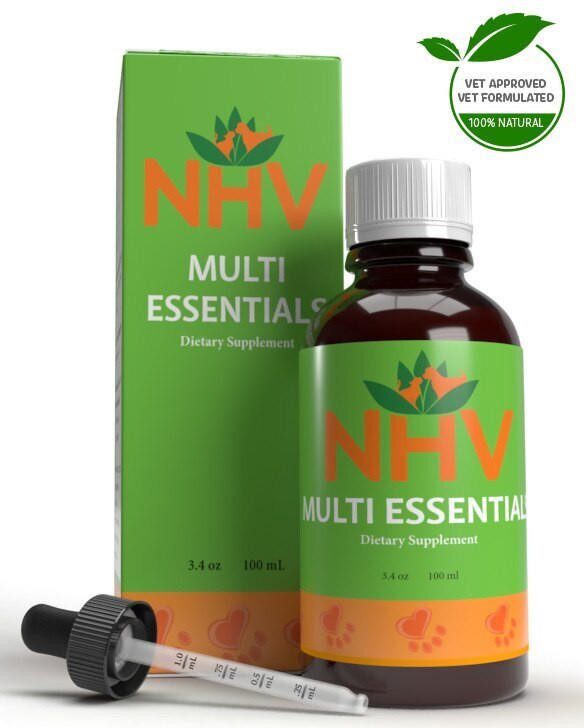
Herbal Digestive Aid, Energy Booster, and Multivitamin for Cats
buy 2 and save $3
3 month supply for a small to medium size pet
These multivitamins for cats will ensure your kitty (of any age) is getting an extra dose of minerals and vitamins for extra energy, vitality, and health.

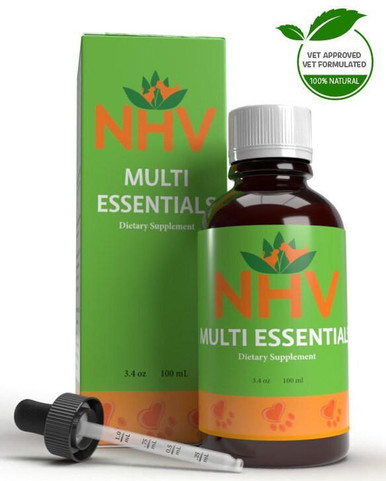
These multivitamins for cats will ensure your kitty (of any age) is getting an extra dose of minerals and vitamins for extra energy, vitality, and health.

The health benefits of multivitamins aren’t just for humans. Cats have many of the same nutrient needs as we do, and some need even more than others depending on their age and health.
A multivitamin supplies the vital nutrients your kitty needs to be healthy and to fight off potential health problems. Dr. Cook, DVM, CVA in her blog states that vitamins “help to regulate the body processes, protect the body from environmental toxins, and break down nutrients such as carbohydrates, proteins, and fats so the body can utilize them”.
The best way to give your cat vitamins and minerals are from whole food sources and not just isolated synthetic vitamins. NHV Multi Essentials contains a powerful blend of alfalfa, oat, dandelion, kelp, parsley, marshmallow, chickweed, stinging nettle, Asian ginseng, yucca and Oregon grape.
Health Benefits of NHV’s Multi-Essentials for Cats
With NHV’s multi vitamins for cats, you get a proprietary blend of all-natural ingredients that are organically grown and contain no artificial additives, preservatives, or coloring. Some of the health benefits include:
Multivitamins for cats will ensure your kitty is getting the proper nutrients that could be lacking due to daily stressors, a poor diet, and environmental toxins.
Signs of Vitamin Deficiency in Your Cat
Kitties Who’ve Benefited from NHV Multi Essentials
NHV multi vitamin for cats has helped thousands of pets around the world. Here are just a few of their stories:
DEALING WITH DIGESTIVE ISSUES: MICI THE CAT LOVES HIS VITAMINS NHV MULTI ESSENTIALS
HERBAL MULTIVITAMINS AND TURMERIC HELP CATS, OATMEAL AND MELISSA LIVE HAPPIER
CAN CATS WITH FELV LIVE A HEALTHY AND NORMAL LIFE?
If you have questions regarding holistic support including vitamin supplements for cats, ask an NHV expert because, at NHV, we want your cat to feel clawtastic naturally!
Select your pet's weight to determine the correct dose.
To be taken twice daily. Determine your pet’s weight and then use the easy chart below to determine the correct dose. This is the minimum dosage.
Pet's Weight Dosage
0 - 15 lb = 0.5 ml
16 - 30 lb = 1.0 ml
31 - 45 lb = 1.5 ml
46 - 60 lb = 2.0 ml
61 - 75 lb = 2.5 ml
Over 75 lb = 3.0 ml
How to Administer
Shake well before use. The easiest method is to use the dropper provide and places the drops into your pet’s food or favorite treat. You can also use the dropper and squirt directly into the pet’s mouth.
Some pets can be finicky, if this occurs consider hiding the drops in foods most pet’s love such as fish, chicken or yogurt or a favorite treat. If your pet only eats dry food then soak a few kibbles at feeding time.
For Best Results
Herbal dietary supplements are beneficial to the health and wellbeing of your pet and are safe for long-term use. Every pet responds to natural herbal supplements differently, therefore it is important to be consistent and administer the product daily. Supplements generally take two to four weeks to take effect, however this will vary from one animal to the next.
Product Storage
All NHV Natural Pet Products are pure herbal extracts and contain no artificial additives, preservatives or coloring. Shelf life after opening is 6 months and must be refrigerated after opening.
Cautions and Contraindications
Do not use Multi Essentials in pregnant or nursing animals. Speak to your vet before using our products. A second visit is recommended if your pet’s condition does not improve, or deteriorates after continued use of the supplements.
All information provided by NHV Natural Pet Products is for educational purposes only.
The health benefits of multivitamins aren’t just for humans. Cats have many of the same nutrient needs as we do, and some need even more than others depending on their age and health.
A multivitamin supplies the vital nutrients your kitty needs to be healthy and to fight off potential health problems. Dr. Cook, DVM, CVA in her blog states that vitamins “help to regulate the body processes, protect the body from environmental toxins, and break down nutrients such as carbohydrates, proteins, and fats so the body can utilize them”.
The best way to give your cat vitamins and minerals are from whole food sources and not just isolated synthetic vitamins. NHV Multi Essentials contains a powerful blend of alfalfa, oat, dandelion, kelp, parsley, marshmallow, chickweed, stinging nettle, Asian ginseng, yucca and Oregon grape.
Health Benefits of NHV’s Multi-Essentials for Cats
With NHV’s multi vitamins for cats, you get a proprietary blend of all-natural ingredients that are organically grown and contain no artificial additives, preservatives, or coloring. Some of the health benefits include:
Multivitamins for cats will ensure your kitty is getting the proper nutrients that could be lacking due to daily stressors, a poor diet, and environmental toxins.
Signs of Vitamin Deficiency in Your Cat
Kitties Who’ve Benefited from NHV Multi Essentials
NHV multi vitamin for cats has helped thousands of pets around the world. Here are just a few of their stories:
DEALING WITH DIGESTIVE ISSUES: MICI THE CAT LOVES HIS VITAMINS NHV MULTI ESSENTIALS
HERBAL MULTIVITAMINS AND TURMERIC HELP CATS, OATMEAL AND MELISSA LIVE HAPPIER
CAN CATS WITH FELV LIVE A HEALTHY AND NORMAL LIFE?
If you have questions regarding holistic support including vitamin supplements for cats, ask an NHV expert because, at NHV, we want your cat to feel clawtastic naturally!
Select your pet's weight to determine the correct dose.
To be taken twice daily. Determine your pet’s weight and then use the easy chart below to determine the correct dose. This is the minimum dosage.
Pet's Weight Dosage
0 - 15 lb = 0.5 ml
16 - 30 lb = 1.0 ml
31 - 45 lb = 1.5 ml
46 - 60 lb = 2.0 ml
61 - 75 lb = 2.5 ml
Over 75 lb = 3.0 ml
How to Administer
Shake well before use. The easiest method is to use the dropper provide and places the drops into your pet’s food or favorite treat. You can also use the dropper and squirt directly into the pet’s mouth.
Some pets can be finicky, if this occurs consider hiding the drops in foods most pet’s love such as fish, chicken or yogurt or a favorite treat. If your pet only eats dry food then soak a few kibbles at feeding time.
For Best Results
Herbal dietary supplements are beneficial to the health and wellbeing of your pet and are safe for long-term use. Every pet responds to natural herbal supplements differently, therefore it is important to be consistent and administer the product daily. Supplements generally take two to four weeks to take effect, however this will vary from one animal to the next.
Product Storage
All NHV Natural Pet Products are pure herbal extracts and contain no artificial additives, preservatives or coloring. Shelf life after opening is 6 months and must be refrigerated after opening.
Cautions and Contraindications
Do not use Multi Essentials in pregnant or nursing animals. Speak to your vet before using our products. A second visit is recommended if your pet’s condition does not improve, or deteriorates after continued use of the supplements.
All information provided by NHV Natural Pet Products is for educational purposes only.
arthritis support
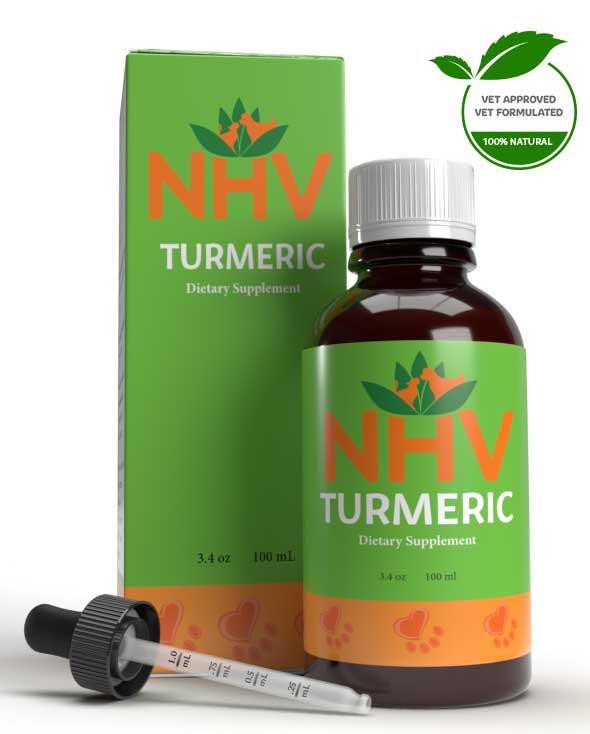
Support for Arthritis and Cancer
buy 2 and save $3
3 month supply for a small to medium size
From their tails to their whiskers, a cat’s body needs to be able to fight whatever comes their way - and not just the toys they like to chase, but health concerns too. NHV Turmeric for cats can be given to your furkiddos for a little extra TLC. This super herb offers support for a variety of conditions like cardiovascular issues, skin health, liver and kidney disease, arthritis, and overall well-being.
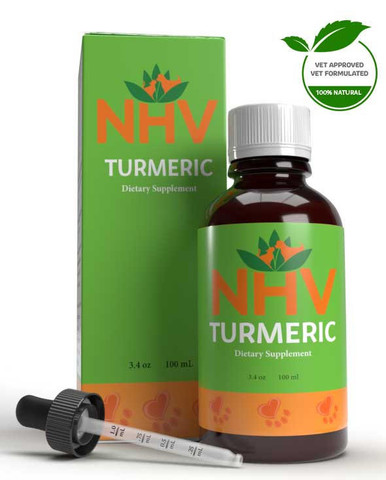
From their tails to their whiskers, a cat’s body needs to be able to fight whatever comes their way - and not just the toys they like to chase, but health concerns too. NHV Turmeric for cats can be given to your furkiddos for a little extra TLC. This super herb offers support for a variety of conditions like cardiovascular issues, skin health, liver and kidney disease, arthritis, and overall well-being.
Want to get your feline friend on a wellness-promoting supplement? Turmeric is an excellent choice - it’s well-tolerated by our whiskered furkiddos, and can offer them many benefits!
What goes into your cat’s body every day will make a difference when it is time to fight a disease, or when they already have one. That’s why NHV supplements are designed to be given each and every day for things like:
It can even be used proactively before your furry friend becomes sick in the first place by giving them a regular boost of natural goodness!
Turmeric itself is a root with vibrant orange-golden flesh. It’s golden in the world of herbalism for pets with its many healing properties.
One of turmeric’s most well-recognized healing properties is its antioxidant content. Antioxidants can help scavenge for free radicals, which are unstable molecules that cause damage to the cells. The free radical scavenging properties of turmeric can support the body in processing and removing these molecules, minimizing the damage they can do.
At NHV, we are experts at harnessing the benefits of herbal ingredients specifically for your pets. When you choose NHV Turmeric, you’re choosing decades of holistic pet wellness experience from vets and herbalists. Our formula is:
We are proud to have been a part of many cats’ success stories over the decades. Check out this feline friend of ours, Willow, who has used our Turmeric for cats formula for comfort and wellness.
Willow’s Story: “I have no doubt that the supplements from NHV have been a huge part in maintaining her health and staving off the cancer that was found in late 2021”
Holistic Veterinarian Approves of Using Turmeric for Cats
Dr. Hillary, a holistic vet, writes an in-depth overview of Turmeric and why she believes turmeric can play a beneficial role in pet health. Read Dr. Hillary’s Turmeric overview here.
All NHV supplements are made with the finest quality organic or ethically harvested herbs. We use non-GMO vegetable glycerin as our base. NHV products are full-spectrum extracts.
Select your pet's weight to determine the correct dose.
To be taken twice daily. Determine your pet’s weight and then use the easy chart below to determine the correct dose. This is the minimum dosage.
Pet's Weight Dosage
0 - 15 lb = 0.5 ml
16 - 30 lb = 1.0 ml
31 - 45 lb = 1.5 ml
46 - 60 lb = 2.0 ml
61 - 75 lb = 2.5 ml
Over 75 lb = 3.0 ml
How to Administer
Shake well before use. The easiest method is to use the dropper provide and places the drops into your pet’s food or favorite treat. You can also use the dropper and squirt directly into the pet’s mouth.
Some pets can be finicky, if this occurs consider hiding the drops in foods most pet’s love such as fish, chicken or yogurt or a favourite treat. If your pet only eats dry food then soak a few kibbles at feeding time.
For Best Results
Herbal dietary supplements are beneficial to the health and wellbeing of your pet and are safe for long-term use. Every pet responds to natural herbal supplements differently, therefore it is important to be consistent and administer the product daily. Supplements generally take two to four weeks to take effect, however this will vary from one animal to the next.
Product Storage
All NHV Natural Pet Products are pure herbal extracts and contain no artificial additives, preservatives or coloring. Shelf life after opening is 6 months and must be refrigerated after opening.
Cautions and Contraindications: Do not use Turmeric in pregnant or nursing animals. Speak to your vet before using our products. A second visit is recommended if your pet’s condition does not improve, or deteriorates after continued use of the supplements.
Want to get your feline friend on a wellness-promoting supplement? Turmeric is an excellent choice - it’s well-tolerated by our whiskered furkiddos, and can offer them many benefits!
What goes into your cat’s body every day will make a difference when it is time to fight a disease, or when they already have one. That’s why NHV supplements are designed to be given each and every day for things like:
It can even be used proactively before your furry friend becomes sick in the first place by giving them a regular boost of natural goodness!
Turmeric itself is a root with vibrant orange-golden flesh. It’s golden in the world of herbalism for pets with its many healing properties.
One of turmeric’s most well-recognized healing properties is its antioxidant content. Antioxidants can help scavenge for free radicals, which are unstable molecules that cause damage to the cells. The free radical scavenging properties of turmeric can support the body in processing and removing these molecules, minimizing the damage they can do.
At NHV, we are experts at harnessing the benefits of herbal ingredients specifically for your pets. When you choose NHV Turmeric, you’re choosing decades of holistic pet wellness experience from vets and herbalists. Our formula is:
We are proud to have been a part of many cats’ success stories over the decades. Check out this feline friend of ours, Willow, who has used our Turmeric for cats formula for comfort and wellness.
Willow’s Story: “I have no doubt that the supplements from NHV have been a huge part in maintaining her health and staving off the cancer that was found in late 2021”
Holistic Veterinarian Approves of Using Turmeric for Cats
Dr. Hillary, a holistic vet, writes an in-depth overview of Turmeric and why she believes turmeric can play a beneficial role in pet health. Read Dr. Hillary’s Turmeric overview here.
All NHV supplements are made with the finest quality organic or ethically harvested herbs. We use non-GMO vegetable glycerin as our base. NHV products are full-spectrum extracts.
Select your pet's weight to determine the correct dose.
To be taken twice daily. Determine your pet’s weight and then use the easy chart below to determine the correct dose. This is the minimum dosage.
Pet's Weight Dosage
0 - 15 lb = 0.5 ml
16 - 30 lb = 1.0 ml
31 - 45 lb = 1.5 ml
46 - 60 lb = 2.0 ml
61 - 75 lb = 2.5 ml
Over 75 lb = 3.0 ml
How to Administer
Shake well before use. The easiest method is to use the dropper provide and places the drops into your pet’s food or favorite treat. You can also use the dropper and squirt directly into the pet’s mouth.
Some pets can be finicky, if this occurs consider hiding the drops in foods most pet’s love such as fish, chicken or yogurt or a favourite treat. If your pet only eats dry food then soak a few kibbles at feeding time.
For Best Results
Herbal dietary supplements are beneficial to the health and wellbeing of your pet and are safe for long-term use. Every pet responds to natural herbal supplements differently, therefore it is important to be consistent and administer the product daily. Supplements generally take two to four weeks to take effect, however this will vary from one animal to the next.
Product Storage
All NHV Natural Pet Products are pure herbal extracts and contain no artificial additives, preservatives or coloring. Shelf life after opening is 6 months and must be refrigerated after opening.
Cautions and Contraindications: Do not use Turmeric in pregnant or nursing animals. Speak to your vet before using our products. A second visit is recommended if your pet’s condition does not improve, or deteriorates after continued use of the supplements.
Published: December 8, 2019